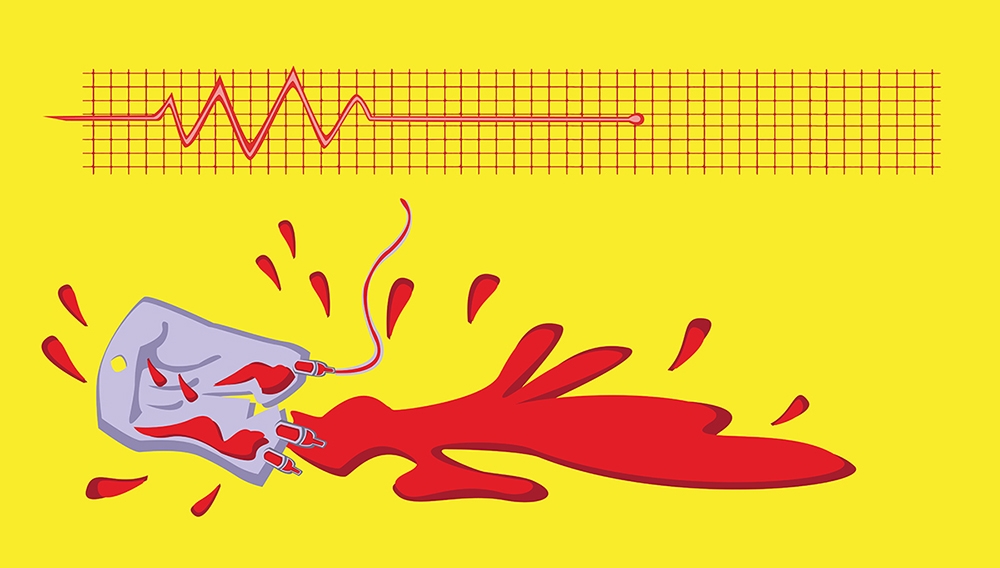Kimberly Lazo | Contributor – Bradley Ferns | LGBTQ+ Supplement Coordinator
Featured illustration by Christopher Lai
June 12 marked the horrific Orlando shooting tragedy, where 49 people were killed and 53 others were injured inside the gay nightclub Pulse. It was another jarring example of how dangerous gun violence in the United States truly is and a reminder of the violent sentiment perpetrated against members of the LGBTQ+ community that many people thought to have been eliminated.
Perhaps most frustrating was the fact that many of those who tried giving blood in hopes to help their injured LGBTQ+ friends and allies were denied due to their sexuality. This tragic irony was difficult to rationalize and further facilitated discussion on whether the ban on donated blood from men who have sex with other men, or MSM, is strictly medical or discriminatory.
The ban on MSM from donating blood in the United States goes back to the mid-1980s at the height of the AIDS pandemic. The US Food and Drug Administration, or FDA, initially asked men who had sex with multiple male partners to not donate blood, but by 1992, the restrictions were extended into a lifetime ban for all men who had ever had sex with another man.
This ban would extend for another 20 years in the United States, when a 2015 shift in policy by the FDA lessened the lifetime ban to accept from men who abstained one year without having sex with men. Earlier this year, the restrictions in Canada were relaxed from five years without sex to one.
Is this ban based on prejudice or science? More importantly, does the ban reinforce the stereotypes of promiscuity and disease in the gay community? Given repeated assurance that the ban is impractical by organizations such as the American Medical Association, it seems like the restrictions imposed by Health Canada are reminiscent of historical racial and gender exclusion.
Ross FitzGerald, a communications specialist from Canadian Blood Services, says: “Men who have sex with men account for the largest proportion of new HIV infections reported in Canada according to data provided by the Public Health Agency of Canada.” By this logic, it might seem to make sense for the ban to exist.
“Patients bear 100 per cent of the risk associated with changes to our eligibility criteria,” adds FitzGerald.
The Canadian Blood Services screens all donations through extensive antibody testing and nucleic acid testing, or NAT, to detect any infectious disease. There is a high degree of safety and a very small risk of bacterial contamination.
That being said, why can’t everyone donate blood, have it screened and be informed if the blood does not meet the criteria?
The Canadian Blood Services’ FAQ section includes answers for why donor screening is needed along with blood testing. According to this section, “Donor screening is intended to reduce the risk of window period infections as well as risk from infections for which there is not test.”
The window period is the time between initial infection and the detection of antibodies in the blood. For HIV, the window period is about nine days, which is significantly reduced with NAT.
The controversial question is why the deferral period is currently one year for MSM if the window period is only nine days. The science might suggest the ban is impractical, but policy put in place by Health Canada does not align with this.
Although this is part of their multi-layered safety procedure to protect the blood supply, it appears unnecessary if the testing is as rigorous as the Canadian Blood Services suggests.
“Canadian Blood Services is also exploring the possibility of moving toward behaviour-based screening. We are working with the LGBTQ+ community, patient groups and other stakeholders to determine whether it is possible to reliably identify low-risk, sexually active men who have sex with other men,” states their FAQ.
The restriction of donating blood is not an issue that only MSM face. Those who have received tattoos or piercings in the last six months, some cancer patients and people with diabetes also face similar restrictions.
The one-year ban on MSM promotes a problematic rhetoric, equating being gay to having HIV-AIDS. It fails to acknowledge that two men without HIV-AIDS in a monogamous-committed relationship have a zero per cent chance of contracting AIDS, and yet these men are included in the population who cannot donate blood. The ban appears to be enforced by the stereotypes that are associated with MSM activity, rather than the scientific and medical research that conclusively supports the ban as being impractical.
The events of the Pulse nightclub shooting in Orlando were a tragic reminder of what the LGBTQ+ community continue to face, especially in regards to healthcare in which public policy has lagged far behind medical research. At a time when the blood supply is facing a significant shortage, it is ludicrous that discriminatory behaviours such as those put forth by Health Canada continue to exist. Our sexualities do not determine our ability to help society, and the quicker this is understood, the faster lives might be saved. Blood might have bounds, but it shouldn’t be determined by who we love.


